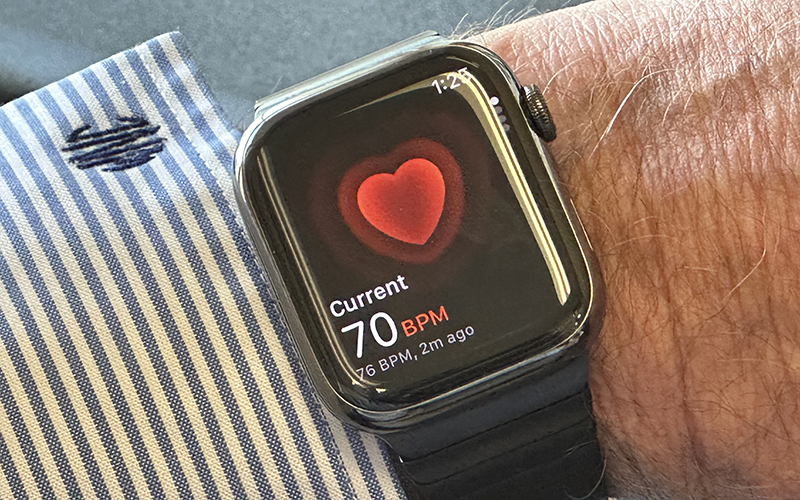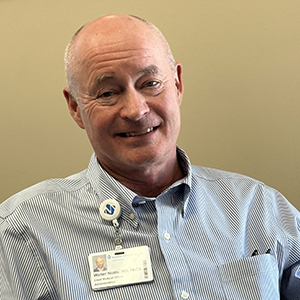Smartwatch Provides a Timely Diagnosis for Doctor

If you have any type of smartwatch, then you’re probably all too familiar with the little buzz on your wrist that’s become a common part the day.
However, the notification Walt Noble, MD, received on his Apple Watch early in the day on November 16 wasn’t for a text or his next appointment but something completely unexpected.

“During the meeting I felt my watch go off and when I looked down it said my heart rate was low,” said Noble. The Apple Watch clearly states it cannot warn of a heart attack, but it will send a notification if your heart rate has dropped below 40 beats per minute for more than 10 minutes. “That’s not an unusual heart rate for elite athletes, but I am not an elite athlete,” he said with a grin.
Checking his pulse, he came to the realization that his heart was in fact beating a little slow, so he reached out to his colleague and friend, Jacques Burgess, MD.
“Dr. Burgess said, “You know, I think we should go down to the ER.”
When they hooked Dr. Noble up to the heart monitor, he said he still had no symptoms and actually felt fine, but his heart rate was just 38 beats per minute. At that point he knew he’d be staying overnight and Dr. David Shapiro and Cardiologist, Dr. John Beattie sent him for a cardiac stress test.
While the Cardiac Diagnostic Team knew they would be getting a patient for testing, at the time, they had no idea it would be the Chief Medical Officer. With that surprise out of the way, Dr. Noble stepped on to the treadmill but took only a few strides before Dr. Anne Hepner cautiously and abruptly said, “Okay, we’re done.”
Dr. Noble was diagnosed with an atrioventricular block or heart block, a condition in which the electrical signal that controls your heartbeat is partially or completely blocked. It can be life-threatening, but many are so mild they go undetected, which might have been the case here had it not been for the Apple Watch.
A cardiac catheterization procedure performed by Dr. Erik Howell that afternoon found no blockages, which was good news, but Dr. Noble did need a pacemaker. Dr. Rob Kennedy performed that procedure on Friday. Dr. Noble would be discharged from the hospital Saturday, and after a careful assessment on Monday morning with no symptoms, he went back to work.
“Do unto others as you would have them do unto you,” said the former general surgeon and MMC Medical Director of Surgical Services. “I spent four decades instructing patients what to do post-surgery, so you better believe I checked with my doctor first. We have such a skilled cardiology team, and the technology is so advanced that by Monday I was feeling back to normal.”
The new tech now monitors his heart rate 24/7 and is connected to an app on his phone. Any sudden changes are immediately sent to the manufacturer and then his cardiologist for follow-up. So far, there’s only been one alert and that’s because his phone temporarily ran out of battery.
Dr. Noble is grateful for the care he received through every step of this process and while he works closely with many of the team members who provided his care, in many instances, he was still a bit of a secret shopper.
“Many of the people who provided my care were unaware of my role or that I even worked at the hospital, I was just a patient. But it was very reassuring to not only see such a consistent approach to safety and process, but more so, the kindness and compassion I received from each person who delivered my care.”
After this experience, you might think Dr. Noble’s advice would be to check your watch, but he is quick to remind that a regular check-up is far more valuable. It’s one to which he has always been whole-heartedly committed.
“Seeing your primary care provider regularly and getting the proper tests is the absolute best way to understand the state of your health and your risks so that when something’s a little ‘off,’ you have someone who’s familiar and knows your history.”
In other words, if it’s been a while since you’ve seen your doctor, schedule a check-up, and if you need a doctor visit munsonhealthcare.org/find-a-doc.
There is no time like the present.